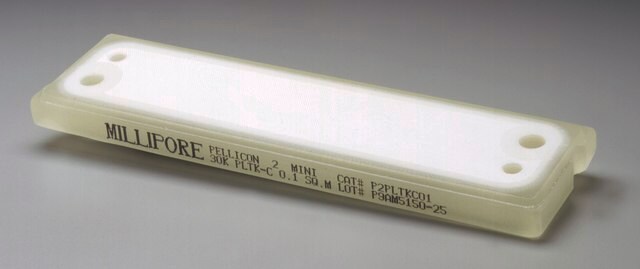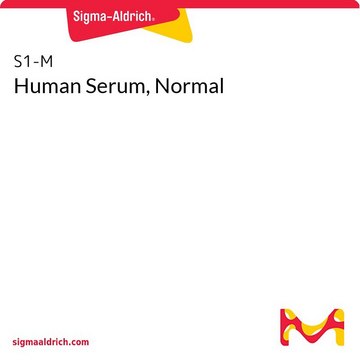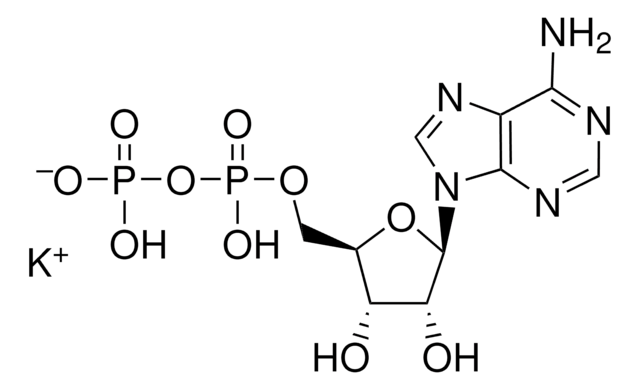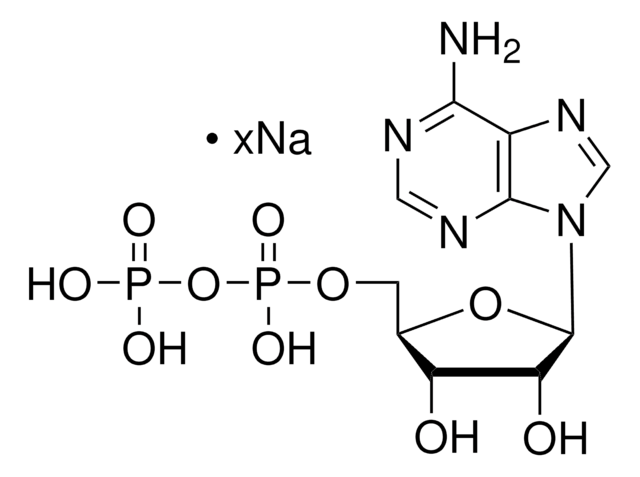HTS028RTA
Gotowe do testów mrożone komórki receptora rodziny somatostatyny sst2
Human
Zaloguj sięWyświetlanie cen organizacyjnych i kontraktowych
About This Item
Kod UNSPSC:
41106514
eCl@ss:
32011203
NACRES:
NA.84
Polecane produkty
Nazwa produktu
Gotowe do testów mrożone komórki receptora rodziny somatostatyny sst2, Human sst2 GPCR frozen cells for Calcium Flux FLIPR Assays.
pochodzenie biologiczne
human
Poziom jakości
producent / nazwa handlowa
Ready-to-Assay
metody
calcium flux assay: suitable
numer dostępu NCBI
metoda wykrywania
fluorometric
Warunki transportu
dry ice
Opis ogólny
Mrożone komórki GPCR Ready-to-Assay firmy Millipore są przeznaczone do prostych, szybkich testów wapniowych bez konieczności intensywnej hodowli komórek. Firma Millipore zoptymalizowała warunki zamrażania, aby zapewnić komórkom wysoką żywotność i funkcjonalność po rozmrożeniu. Użytkownik po prostu rozmraża komórki i ponownie zawiesza je w pożywce, dozuje zawiesinę komórek na płytki testowe i po nocnym odpoczynku przeprowadza testy odpowiedzi na wapń.
Somatostatyna (sst) jest wielofunkcyjnym peptydem o dwóch biologicznie aktywnych formach, sst-14 i sst-28, które są syntetyzowane w neuronach w mózgu, a także w tkankach obwodowych, takich jak trzustka i jelita (Gillies, 1997). SST wywiera zróżnicowany wachlarz efektów, które obejmują hamowanie wydzielania hormonalnego, modulację neurotransmisji i regulację proliferacji komórek poprzez stymulację rodziny pięciu receptorów sprzężonych z białkiem G. Receptor somatostatyny sst2 mRNA ulega ekspresji głównie w ośrodkowym układzie nerwowym. Badanie z wykorzystaniem myszy z nokautem sst2 wykazało zwiększone zachowanie związane z lękiem, podczas gdy aktywność lokomotoryczna i eksploracyjna była zmniejszona w sytuacjach wywołujących stres (w połączeniu ze wzrostem uwalniania przysadkowego ACTH, regulatora odpowiedzi na stres) (Viollet i in., 2000). Na obwodzie hamowanie uwalniania glukagonu przez sst w wysepkach myszy odbywa się głównie za pośrednictwem sst2 (Strowski i in., 2000). Ponadto endogenna sst działa poprzez sst2 w celu hamowania wydzielania kwasu żołądkowego poprzez hamowanie aktywności gastryny (Martinez i in., 1998). Sklonowana przez Millipore ludzka linia komórkowa z ekspresją sst2 jest wytwarzana w gospodarzu Chem-1, który wspiera wysoki poziom ekspresji rekombinowanego sst2 na powierzchni komórki i zawiera wysoki poziom białka Gα15, aby połączyć receptor ze szlakiem sygnalizacji wapniowej. Linia komórkowa jest zatem idealnym narzędziem do badań przesiewowych agonistów, antagonistów i modulatorów sst2.
Somatostatyna (sst) jest wielofunkcyjnym peptydem o dwóch biologicznie aktywnych formach, sst-14 i sst-28, które są syntetyzowane w neuronach w mózgu, a także w tkankach obwodowych, takich jak trzustka i jelita (Gillies, 1997). SST wywiera zróżnicowany wachlarz efektów, które obejmują hamowanie wydzielania hormonalnego, modulację neurotransmisji i regulację proliferacji komórek poprzez stymulację rodziny pięciu receptorów sprzężonych z białkiem G. Receptor somatostatyny sst2 mRNA ulega ekspresji głównie w ośrodkowym układzie nerwowym. Badanie z wykorzystaniem myszy z nokautem sst2 wykazało zwiększone zachowanie związane z lękiem, podczas gdy aktywność lokomotoryczna i eksploracyjna była zmniejszona w sytuacjach wywołujących stres (w połączeniu ze wzrostem uwalniania przysadkowego ACTH, regulatora odpowiedzi na stres) (Viollet i in., 2000). Na obwodzie hamowanie uwalniania glukagonu przez sst w wysepkach myszy odbywa się głównie za pośrednictwem sst2 (Strowski i in., 2000). Ponadto endogenna sst działa poprzez sst2 w celu hamowania wydzielania kwasu żołądkowego poprzez hamowanie aktywności gastryny (Martinez i in., 1998). Sklonowana przez Millipore ludzka linia komórkowa z ekspresją sst2 jest wytwarzana w gospodarzu Chem-1, który wspiera wysoki poziom ekspresji rekombinowanego sst2 na powierzchni komórki i zawiera wysoki poziom białka Gα15, aby połączyć receptor ze szlakiem sygnalizacji wapniowej. Linia komórkowa jest zatem idealnym narzędziem do badań przesiewowych agonistów, antagonistów i modulatorów sst2.
Opis linii komórkowej
Komórki gospodarza: Chem-1
Linie komórkowe GPCR
Działania biochem./fizjol.
GPCR Class: A
Protein Target: sst2
Target Sub-Family: Somatostatin
Komponenty
Pack contains 2 vials of mycoplasma-free cells, 1 ml per vial. Fifty (50) mL of Media Component.
Ta strona może zawierać tekst przetłumaczony maszynowo.
Kod klasy składowania
10 - Combustible liquids
Klasa zagrożenia wodnego (WGK)
WGK 1
Temperatura zapłonu (°F)
Not applicable
Temperatura zapłonu (°C)
Not applicable
Certyfikaty analizy (CoA)
Poszukaj Certyfikaty analizy (CoA), wpisując numer partii/serii produktów. Numery serii i partii można znaleźć na etykiecie produktu po słowach „seria” lub „partia”.
Masz już ten produkt?
Dokumenty związane z niedawno zakupionymi produktami zostały zamieszczone w Bibliotece dokumentów.
Nasz zespół naukowców ma doświadczenie we wszystkich obszarach badań, w tym w naukach przyrodniczych, materiałoznawstwie, syntezie chemicznej, chromatografii, analityce i wielu innych dziedzinach.
Skontaktuj się z zespołem ds. pomocy technicznej








